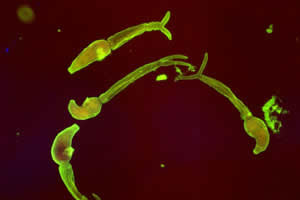Description:
Schistosomiasis Vaccine for Tropical Disease Bilharzia
Schistosomiasis, known as snail fever or bilharzia, is a tropical disease caused by several types of parasites called schistosomes that infest open bodies of water. A scistosoma vaccine has been developed that could help eradicate this parasitic disease and save millions of lives.
Snail fever is second only to malaria in terms of its devastating social, economic, and public health impact in tropical and subtropical regions of the world.
Children acquire the schistosomiasis disease by swimming in infected water where the parasitic larvae shed from snails can easily enter through their skin. Upon contact the parasite burrows into the skin, then mature into an adult worm that migrates to other body parts and cause chronic illness that can damage internal organs and impair growth and brain development. This waterborne disease can enter the body through any contact with infested water such as washing hands, washing food, fishing, and farming, affecting habitants as well as tourists.
The schistosome vaccine can be administered to small children in order to prevent severe infection in the high risk age range of 3-12 years old, when contact with parasite-infected water is maximized. This schistosome treatment would greatly reduce the need for logistically difficult and expensive drug-based programs such as the chemotherapy treatments which are expensive, difficult to administer, and fail to significantly reduce transmission of the disease in endemic areas.
According to the World Health Organization about 750 million people are at risk for schistosomiasis and should be vaccinated. Currently there are no commercially available vaccines against schistosomiasis which afflicts over 200 million people in 76 different countries primarily in Asia, Africa and South America. Symptomatic schistosomiasis can result in increased susceptibility to STD infection including HIV which is prevalent in many countries plagued by schistosoma.
Schistosome Vaccine More Effective Than Chemotherapy
Current schistosoma vaccine research is focused on a membrane protein, tetraspanin, however, this membrane protein has been shown to be highly variable which limits the potential long-term efficacy of those vaccines. Chemotherapeutic drugs are considered safe and effective for the treatment of schistosomiasis, however re-infection frequently occurs following drug treatment. An effective vaccine is critical toward providing long-term treatment.
Immunization formulation tests with a sub unit of the schistosome protein, designated as Sm-p80, resulted in a significant level of protective immunity against schistosome infection in mice and baboons, and the development of this Sm-p80 -DNA based schistosoma vaccine has been successful in eliminating 100% of the schistosoma pathogen in recent trials. The animal trials were shown to induce protective immunity in mice and baboons, and completely eliminate the parasite in the host.
Schistosomiasis Vaccine Opportunity for GAVI Alliance, Pharmaceutical Companies
This schistosoma vaccine offers unique opportunities for organizations to market it as a method for completely eliminating schistosoma disease. Potential partners include:
- GAVI (Global Alliance for Vaccines and Immunization) - a global health partnership committed to saving children's lives and protecting people's health by increasing access to immunization in poor countries, and developing vaccines for Neglected Tropical Diseases.
- Pharmaceutical companies such as Merck, Pfizer and GlaxoSmithKline
- Charitable organizations such as the Bill and Melinda Gates foundation.
The vaccines advantages make it easy to sell.
- Eliminates the instances of re-infection common with current chemotherapeutic drugs
- Easier and less expensive to distribute and administer than chemotherapy
- More stable than vaccines based on membrane protein, tetraspanin, which ensures long-term efficacy
- Will effectively reduce the transmission of schistosomiasis in endemic areas
Based on the promising test results, the UNDP/World Bank/WHO-TDR special panel has designated, Sm-p80 as one of the priority antigens with “established credentials, needing further development” and Sm-p80 is now considered as one of the “first-tier candidates” by international experts in the field. Ongoing studies have provided proof of concept in order to move the vaccine into human trials.
